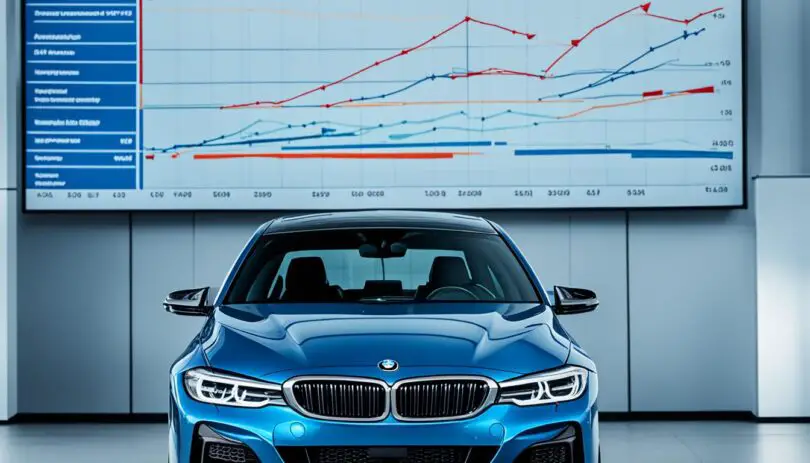When considering purchasing a used car, the idea of investing in a luxury vehicle like a BMW may seem appealing. But is a 5-year-old BMW really a good investment? In this article, I will explore the benefits and risks of buying a used BMW and provide a comprehensive analysis to help you make an informed decision.
Key Takeaways:
- Reliability and Luxury: Used BMWs are known for their reputation for reliability and luxury, offering a high-quality driving experience.
- Significant Savings: Buying a 5-year-old BMW allows for significant savings compared to buying a new car, as new cars depreciate quickly.
- Higher Costs: It’s important to consider the higher costs associated with luxury and foreign cars, such as insurance premiums, registration fees, and maintenance expenses.
- Model Variations: There are several types of used BMW models to choose from, each offering unique features and benefits.
- Maintenance and Repair Costs: Owning a used BMW can be more expensive in terms of maintenance and repair costs due to specialty parts and labor.
Types of Used BMW Models
When considering buying a used BMW, it’s important to explore the various models available. BMW offers a range of models, each with its own unique features and benefits. Whether you’re looking for a small and sporty option or a larger and more luxurious vehicle, BMW has something to suit your needs and preferences.
BMW 1 Series
The BMW 1 Series is a compact, rear-wheel-drive four-seater that is known for its speed and agile handling. It combines a sleek, sporty design with impressive performance, making it a popular choice for those seeking a thrilling driving experience.
BMW 3 Series
The BMW 3 Series is a versatile and perennial best-seller. Available in sedan or wagon models, it offers a balance of performance, comfort, and practicality. With its luxurious interior and advanced technology features, the 3 Series is a great option for those seeking a combination of style and functionality.
BMW 5 Series and 7 Series
For those who prioritize space and luxury, the BMW 5 Series and 7 Series are excellent choices. These models offer larger interiors, ensuring a comfortable and opulent driving experience. Depending on the model year, they may also come with diesel and hybrid engine options, providing both power and fuel efficiency.
When choosing a used BMW model, it’s essential to research each model’s specifications, features, and performance capabilities. This will help you determine which model best suits your lifestyle and preferences.
Benefits of Owning a Used BMW
There are several benefits to owning a used BMW. Firstly, BMWs are known for their luxury and comfort, offering a superb cabin design and high-quality materials. Even a used BMW with high mileage can still look and feel expensive and luxurious.
One of the significant advantages of buying a used BMW is the significant savings in price compared to buying new. New cars can lose up to 60% of their value in the first five years, making a five-year-old BMW a more affordable option. This means you can enjoy the same level of refinement and performance at a fraction of the cost.
Furthermore, BMWs have a reputation for holding their resale value well. This means that when you decide to sell or trade-in your used BMW, you can expect to get a higher percentage of your original investment back. This helps to offset some of the ownership costs in the long run.
Another important benefit of owning a used BMW is their reliability. BMWs are known for their robust engineering and quality components, ensuring a dependable driving experience. With proper maintenance and care, a used BMW can provide peace of mind on the road, offering a sense of security and reliability.
“Even a used BMW with high mileage can still look and feel expensive and luxurious.”
The Luxury Experience
One of the primary reasons why people choose to own a BMW is the luxury experience it offers. Whether you’re driving a brand new model or a used BMW, the level of luxury and comfort remains unmatched. The cabin design, premium materials, and advanced features create an upscale atmosphere that elevates the driving experience.
Savings Compared to Buying New
Buying a used BMW makes financial sense for those looking to save money. As mentioned earlier, new cars depreciate quickly, which means you can secure a used BMW at a significantly lower price compared to its original value. This allows you to enjoy the benefits of BMW ownership without breaking the bank.
Resale Value
BMW has a strong resale value compared to many other brands. This means that when the time comes to sell or trade-in your used BMW, you can expect a higher return on your investment. The enduring popularity of the brand and the demand for used BMWs contribute to their strong resale value.
Reliability
BMW’s reputation for reliability is well-deserved. When you purchase a used BMW, you can trust that it has been engineered to withstand the test of time. However, it’s essential to note that regular maintenance and servicing are crucial for preserving the reliability of any vehicle.
Overall, owning a used BMW comes with a range of benefits, including the luxury experience, significant cost savings, strong resale value, and reliable performance. By considering these advantages, you can make an informed decision and embark on an enjoyable journey as a BMW owner.
Disadvantages of Owning a Used BMW
Despite the benefits, owning a used BMW comes with a few disadvantages that potential buyers should be aware of. Here are some of the cons associated with purchasing a 5-year-old BMW:
- Risks of buying a used BMW: Luxury cars like BMWs often come with higher insurance premiums and registration costs compared to non-luxury vehicles.
- Higher maintenance expenses: As BMWs get older, the cost of maintenance increases. Specialty maintenance, imported replacement parts, premium gasoline, and high-end tires all contribute to the higher upkeep costs.
- Expensive repairs: Repairs for BMWs can be more costly compared to domestic cars. The premium nature of the brand often translates to higher labor costs and the need for specialized expertise.
- Electrical problems: BMWs have been known to experience electrical issues, which can be challenging and expensive to fix.
While these disadvantages exist, they should not overshadow the overall appeal and benefits of owning a used BMW. However, it is important to take these factors into consideration when making a purchasing decision.
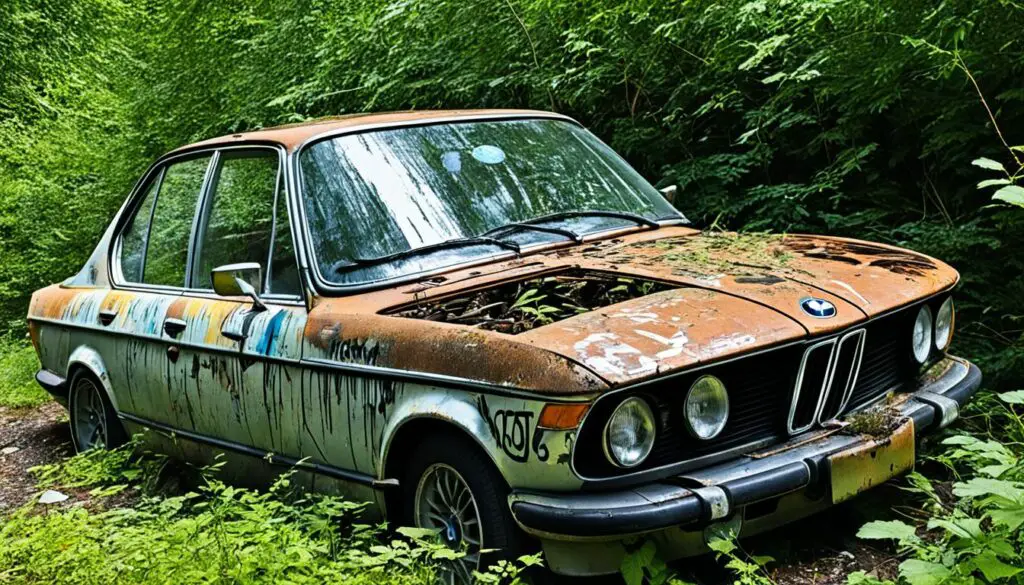
Despite the drawbacks mentioned above, the allure of owning a used BMW, with its luxury, performance, and reputation, can still outweigh the cons for many buyers. It ultimately comes down to personal preferences, budget, and the willingness to take on the responsibilities of owning a premium vehicle.
Maintenance and Repairs for Used BMWs
Maintaining a used BMW can be more costly compared to maintaining a non-luxury car. BMWs require specialized maintenance, resulting in higher labor and parts expenses. The intricate electronics system in BMWs necessitates diagnostics from specialized equipment. Additionally, premium gasoline, high-end tires, and synthetic oil changes are pricier for BMWs. To ensure proper maintenance and minimize costs, it is essential to find a specialty mechanic experienced in working with BMWs. When considering a used BMW, budgeting for ongoing maintenance and potential repairs is crucial.
| Maintenance Cost | Price Range |
|---|---|
| Regular Servicing (Oil changes, filter replacements, brake inspections) | £150 – £300 per service |
| Specialized Maintenance (Electronics system, diagnostics) | £200 – £500 per issue |
| Premium Gasoline | £1.20 – £1.50 per litre |
| High-End Tires | £100 – £300 per tire |
| Synthetic Oil Changes | £80 – £150 per change |
Resale Value of Used BMWs
The resale value of a used BMW can vary depending on the specific model and condition. When considering buying a used BMW, it is important to research the true market value of the particular model you are interested in.
The true market value takes into account various factors, such as trade-in value, private party sale, dealer retail list, and Certified Used Vehicle price. To determine the fair value of a used BMW, you can utilize pricing tools available online.
Understanding the resale value of a used BMW can be advantageous when negotiating a fair price during the buying process. By having a clear understanding of the true market value, you can ensure that you are getting the most value for your investment.
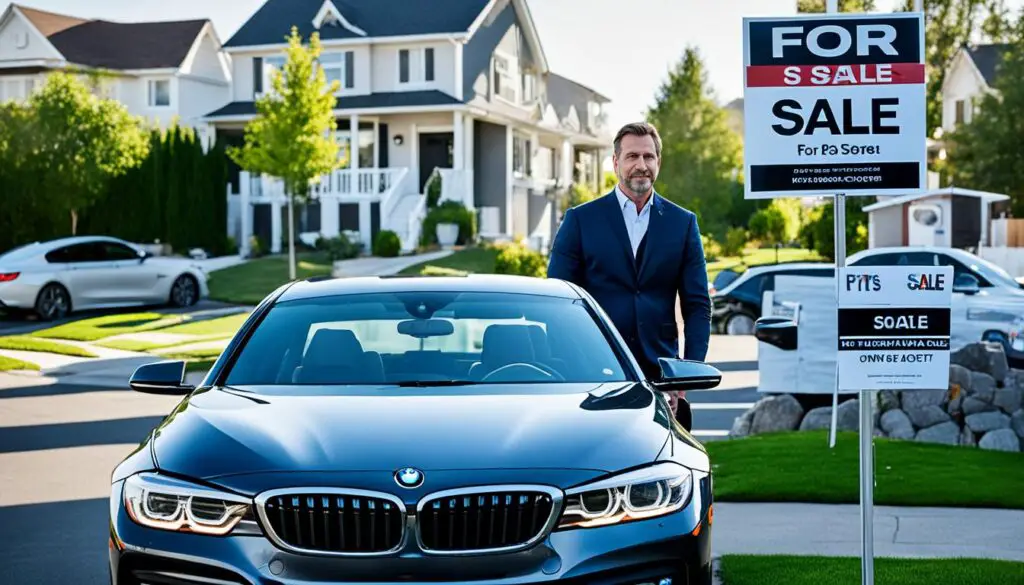
Buyers’ Experience with Used BMWs
When it comes to buying used BMWs, there is divided opinion among experienced owners and mechanics. Some swear by the brand’s performance and luxury, while others caution against potential problems and high ownership costs. It’s important to weigh the pros and cons before making a decision.
Pros:
- Performance: Used BMWs are known for their powerful engines and excellent handling, providing a thrilling driving experience.
- Luxury and Comfort: BMWs offer top-notch interiors with high-quality materials and advanced features, ensuring a comfortable and enjoyable ride.
- Prestige: Owning a BMW is often associated with a certain status and prestige, making it an attractive choice for many buyers.
- Ownership Experience: The satisfaction of owning a BMW and being part of the brand’s legacy is a key factor for many enthusiasts.
Cons:
- Electrical Problems: Some BMW models have been known to experience electrical issues, which can be costly to diagnose and repair.
- Expensive Parts and Labor: BMWs have higher maintenance and repair costs compared to non-luxury brands. Specialty parts and labor can be more expensive.
- Reliability Concerns: While BMWs are generally reliable vehicles, certain models and years may have specific reliability concerns. Thorough research and vehicle history checks are essential.
“I’ve had my used BMW for years and it’s been a dream to drive. The performance and luxury are unparalleled. However, I have had to deal with costly repairs and maintenance.” – Mark, BMW Owner
Despite the potential drawbacks, many BMW owners have positive experiences with their used vehicles. Proper maintenance and regular servicing can help mitigate potential issues.
“I bought a used BMW and it has been a fantastic car. It looks great, performs well, and I haven’t had any major issues. Regular maintenance is key!” – Sarah, BMW Owner
Table: Pros and Cons of Buying a Used BMW
| Pros | Cons |
|---|---|
| Performance | Electrical Problems |
| Luxury and Comfort | Expensive Parts and Labor |
| Prestige | Reliability Concerns |
| Ownership Experience |
Ultimately, purchasing a used BMW requires thorough research, careful consideration of the pros and cons, and finding a reputable mechanic for maintenance and repairs. With the right precautions, it is possible to have a positive ownership experience and enjoy the benefits of owning a luxury vehicle.

Financing Options for a Used BMW
When it comes to purchasing a used BMW, financing options are available to make the process more affordable. There are two primary financing options to consider: traditional car loans from banks or credit unions, and dealer financing.
With a traditional car loan, you can apply for financing from a bank or credit union, and if approved, you will receive a loan amount to purchase the used BMW. It is advisable to shop around and compare interest rates, terms, and monthly payments from different lenders to find the best financing option for your needs.
Dealer financing, on the other hand, is offered directly by the dealership where you are purchasing the used BMW. This option may be convenient as you can complete the financing process at the same location, but it’s important to carefully review the terms and conditions, including the interest rate and any additional fees.
Regardless of the financing option you choose, it’s crucial to consider the total cost of the loan. This includes not only the principal amount but also the interest charged over the loan term, any fees associated with the loan, and any additional expenses such as insurance.
| Financing Option | Pros | Cons |
|---|---|---|
| Traditional Car Loans |
|
|
| Dealer Financing |
|
|
To ensure a smooth buying process for a used BMW, it is recommended to research and secure the appropriate financing option that aligns with your financial situation and goals. By taking the time to compare rates and terms, as well as considering the total cost of the loan, you can make an informed decision and enjoy your newly purchased used BMW.
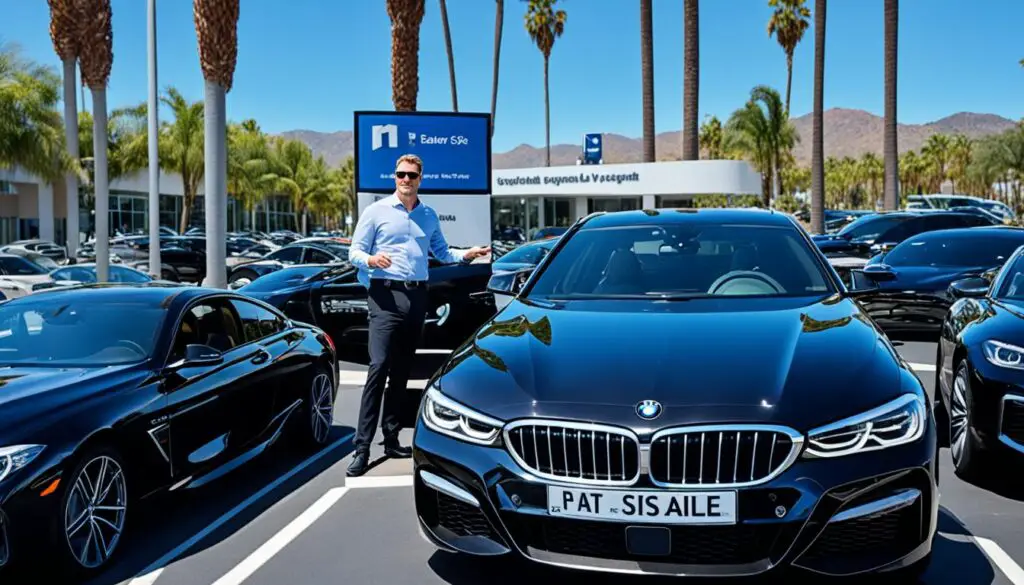
Pros and Cons of Leasing a Used BMW
Leasing a used BMW can be an alternative option for those who prefer lower monthly payments and the ability to upgrade to a different car in a few years. Leasing allows for lower upfront costs and lower depreciation costs, as the car is returned to the dealership at the end of the lease term. However, leasing comes with mileage restrictions and additional fees for wear and tear. It is important to carefully consider the terms of the lease and evaluate whether it aligns with your driving habits and future plans. Leasing may not be the best option for everyone, so it is crucial to weigh the pros and cons before deciding to lease a used BMW.
Leasing a used BMW comes with its fair share of advantages and disadvantages. Let’s take a closer look at the pros and cons:
Pros of Leasing a Used BMW
- Lower monthly payments: Leasing a used BMW typically results in lower monthly payments compared to buying a brand-new car. This can be beneficial for individuals who want to enjoy the luxury and performance of a BMW while keeping their monthly expenses more manageable.
- Ability to upgrade: Leasing allows you to drive a newer model BMW with the latest features and technology. At the end of your lease term, you have the option to return the car and upgrade to a different model or lease a new BMW.
- Lower upfront costs: Leasing a used BMW often requires a lower down payment and may not require a substantial upfront cost.
- Lower depreciation costs: When you lease a car, you don’t have to worry about its value depreciating over time. At the end of the lease, you simply return the car to the dealership without having to deal with the potential depreciation that comes with owning a vehicle.
Cons of Leasing a Used BMW
- Mileage restrictions: Leasing contracts typically come with mileage restrictions, which can limit your freedom to drive as much as you would like. Exceeding the agreed-upon mileage limit can result in additional fees.
- Fees for wear and tear: Leasing a used BMW may involve extra fees for excessive wear and tear on the vehicle. It’s important to carefully review the terms of the lease to understand what constitutes wear and tear and how any associated fees may apply.
- No ownership equity: Unlike owning a car, leasing a vehicle means that you won’t build any equity in the car. At the end of the lease term, you return the car without having any ownership stake in it.
- Potential for additional costs: While leasing offers lower monthly payments, there may be additional costs associated with the lease, such as lease acquisition fees, security deposits, and disposition fees at the end of the lease term.
It’s important to carefully evaluate your personal financial situation, lifestyle, and preferences before deciding whether leasing a used BMW is the right choice for you. Consider factors such as your driving habits, long-term plans, and budget. While leasing can offer some advantages, it may not suit everyone’s needs and circumstances. Take the time to compare leasing options, read the fine print, and make an informed decision that aligns with your goals and priorities.
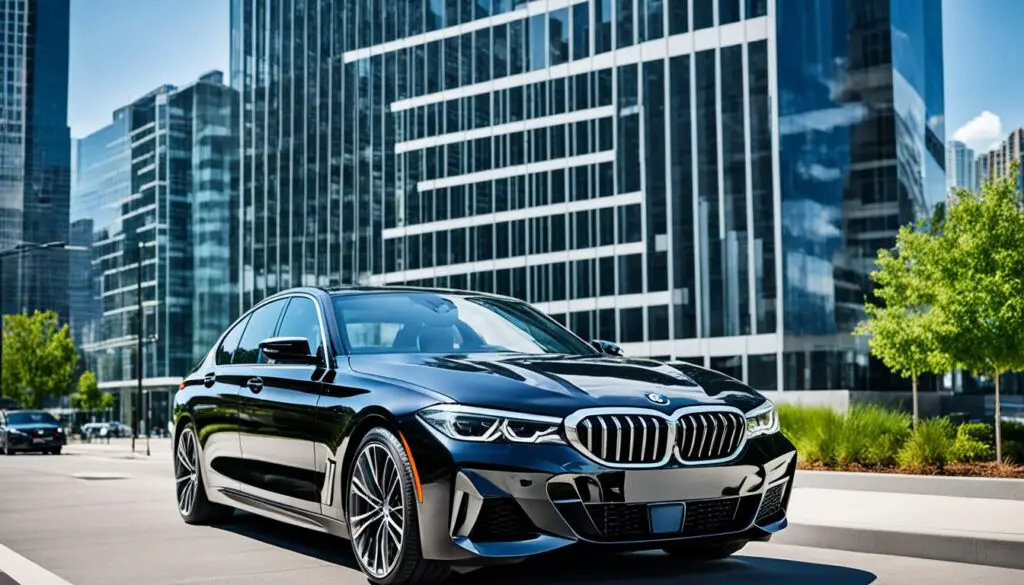
Factors to Consider Before Buying a Used BMW
Before purchasing a used BMW, it’s crucial to take several factors into consideration. These factors will help you make an informed decision and ensure a positive ownership experience. Let’s explore the key considerations and tips to keep in mind when buying a used BMW.
Research the Specific Model
Start by researching the specific BMW model you’re interested in. Each model has its own unique features and characteristics, so it’s essential to find one that aligns with your needs and preferences. Consider factors such as size, performance, fuel efficiency, and available options.
Understand the True Market Value
Understanding the true market value of the used BMW you’re considering is crucial. Take the time to research the average selling price for similar models in your area. This will help you negotiate a fair price and ensure you’re getting a good deal.
Estimate Ownership Costs
Before making a purchase, estimate the ownership costs associated with the used BMW. This includes expenses such as insurance, maintenance, repairs, and fuel costs. Consider the potential higher costs of luxury and foreign vehicles, and make sure they align with your budget.
Consider Financing Options
Explore the various financing options available to you when buying a used BMW. Compare interest rates, loan terms, and monthly payments from different lenders to find the best option that suits your financial situation. It’s crucial to consider the total cost of the loan, including any additional fees or charges.
Thoroughly Inspect the Vehicle
Before finalizing the purchase, thoroughly inspect the used BMW. Look for any signs of damage, wear and tear, or mechanical issues. It’s advisable to hire a trusted mechanic to conduct a pre-purchase inspection, which will help identify any hidden problems.
Check Service History
Review the service history of the used BMW to ensure it has received regular maintenance and necessary repairs. A well-maintained vehicle is more likely to provide a reliable and trouble-free ownership experience.
Make an Informed Decision
By considering these factors and following these tips, you can make an informed decision when buying a used BMW. Taking the time to research, inspect the vehicle, and estimate ownership costs will help ensure a smooth and satisfying purchase.
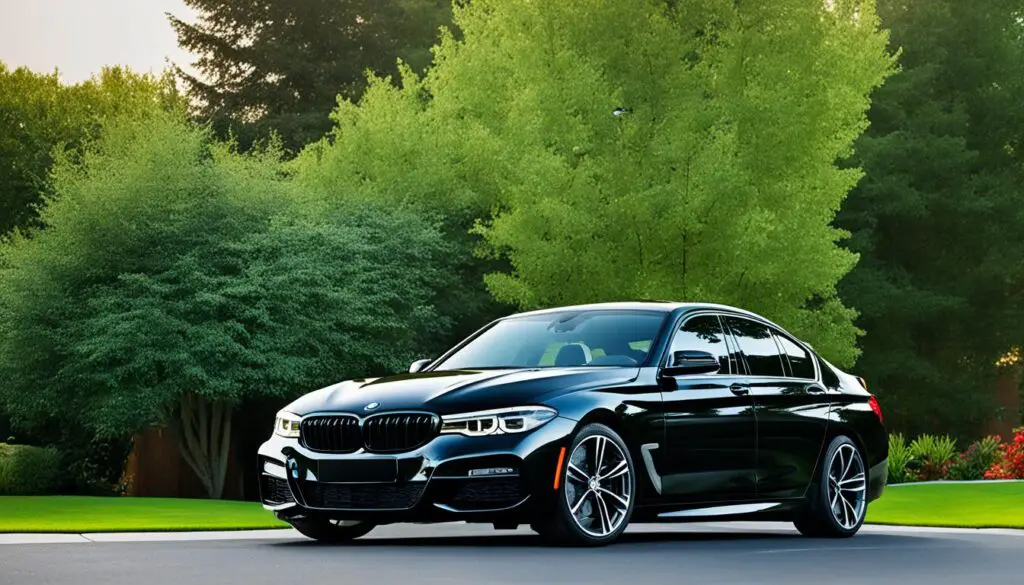
Maintenance Tips for Owning a Used BMW
Proper maintenance is essential for the longevity and performance of a used BMW. Regular servicing, including oil changes, filter replacements, and brake inspections, is necessary to keep the car running smoothly. Finding a reputable mechanic with experience working on BMWs is crucial, as specialized knowledge is often required for maintenance and repairs. Additionally, it is important to follow the manufacturer’s recommended maintenance schedule and keep up with any recalls or service campaigns. Taking proactive care of a used BMW can minimize potential issues and ensure a reliable and enjoyable ownership experience.
If you own a used BMW, here are some maintenance tips to keep your car in top shape:
- Regularly check and change the oil: The engine oil is vital for lubricating the engine parts and reducing friction. Regularly check the oil level and change it according to the manufacturer’s recommendations. Use high-quality synthetic oil for optimal performance.
- Replace filters: The air filter and fuel filter should be replaced at the recommended intervals. Clean filters ensure proper air intake and fuel flow, enhancing engine efficiency.
- Inspect and maintain the brakes: Regularly check the brake pads, discs, and brake fluid levels. Replace worn-out brake pads and discs to maintain optimal braking performance. Flush and replace the brake fluid according to the manufacturer’s guidelines.
- Keep an eye on the tires: Check the tire pressure regularly and ensure they are properly inflated. Inspect the tires for any signs of wear or damage. Rotate the tires at recommended intervals to promote even tire wear.
- Follow the recommended maintenance schedule: BMW provides a maintenance schedule that outlines the specific services and inspections required at different mileage intervals. Adhere to this schedule to ensure your BMW is properly maintained.
- Address issues promptly: If you notice any unusual noises, vibrations, or warning lights, don’t ignore them. Addressing issues promptly can prevent further damage and costly repairs. Consult a certified BMW mechanic for professional diagnostics and repairs.
“Proper maintenance is essential for the longevity and performance of a used BMW.”
By following these maintenance tips and practicing proactive car care, you can ensure that your used BMW remains in excellent condition, providing a reliable and enjoyable driving experience for years to come.
Conclusion
Owning a 5-year-old BMW can be a worthwhile investment for those who value luxury, reliability, and performance. However, it is crucial to carefully consider the potential drawbacks and expenses associated with owning a used BMW. This includes higher insurance premiums, maintenance costs, and the need for specialized repairs. Thorough research, diligent maintenance, and thoughtful evaluation of financing options can help mitigate risks and ensure a positive ownership experience. Ultimately, the decision to purchase a used BMW should be based on individual preferences, budget constraints, and the willingness to assume the responsibilities of owning a luxury vehicle.

